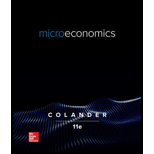
MICROECONOMICS (LL)-W/ACCESS >CUSTOM<
11th Edition
ISBN: 9781264207718
Author: Colander
Publisher: MCG CUSTOM
expand_more
expand_more
format_list_bulleted
Question
Chapter 12.1, Problem 1Q
To determine
Explain if a process is economically efficient, and also find if it is technically efficient or not.
Expert Solution & Answer
Want to see the full answer?
Check out a sample textbook solution
Students have asked these similar questions
Published in 1980, the book Free to Choose discusses how economists Milton Friedman and Rose Friedman proposed a one-sided view of the benefits of a voucher system. However, there are other economists who disagree about the potential effects of a voucher system.
The following diagram illustrates the demand and
marginal revenue curves facing a monopoly in an industry
with no economies or diseconomies of scale. In the short
and long run, MC = ATC.
a. Calculate the values of profit, consumer surplus, and
deadweight loss, and illustrate these on the graph.
b. Repeat the calculations in part a, but now assume
the monopoly is able to practice perfect price
discrimination.
The projects under the 'Build, Build, Build' program: how these projects improve connectivity and ease of doing business in the Philippines?
Chapter 12 Solutions
MICROECONOMICS (LL)-W/ACCESS >CUSTOM<
Ch. 12.1 - Prob. 1QCh. 12.1 - Prob. 2QCh. 12.1 - Prob. 3QCh. 12.1 - Prob. 4QCh. 12.1 - Prob. 5QCh. 12.1 - Prob. 6QCh. 12.1 - Prob. 7QCh. 12.1 - Prob. 8QCh. 12.1 - Prob. 9QCh. 12.1 - Prob. 10Q
Ch. 12.A - Prob. 1QECh. 12.A - Prob. 2QECh. 12.A - Prob. 3QECh. 12.A - Prob. 4QECh. 12.A - Prob. 5QECh. 12.A - Prob. 6QECh. 12.A - Prob. 7QECh. 12 - Prob. 1QECh. 12 - Prob. 2QECh. 12 - Prob. 3QECh. 12 - Prob. 4QECh. 12 - Prob. 5QECh. 12 - Prob. 6QECh. 12 - Prob. 7QECh. 12 - Prob. 8QECh. 12 - Prob. 9QECh. 12 - Prob. 10QECh. 12 - Prob. 11QECh. 12 - Prob. 12QECh. 12 - Prob. 13QECh. 12 - Prob. 14QECh. 12 - Prob. 15QECh. 12 - Prob. 16QECh. 12 - Prob. 17QECh. 12 - Prob. 1QAPCh. 12 - Prob. 2QAPCh. 12 - Prob. 3QAPCh. 12 - Prob. 4QAPCh. 12 - Prob. 5QAPCh. 12 - Prob. 1IPCh. 12 - Prob. 2IPCh. 12 - Prob. 3IPCh. 12 - Prob. 4IPCh. 12 - Prob. 5IPCh. 12 - Prob. 6IP
Knowledge Booster
Similar questions
- Critically analyse the five (5) characteristics of Ubuntu and provide examples of how they apply to the National Health Insurance (NHI) in South Africa.arrow_forwardCritically analyse the five (5) characteristics of Ubuntu and provide examples of how they apply to the National Health Insurance (NHI) in South Africa.arrow_forwardOutline the nine (9) consumer rights as specified in the Consumer Rights Act in South Africa.arrow_forward
- In what ways could you show the attractiveness of Philippines in the form of videos/campaigns to foreign investors? Cite 10 examples.arrow_forwardExplain the following terms and provide an example for each term: • Corruption • Fraud • Briberyarrow_forwardIn what ways could you show the attractiveness of a country in the form of videos/campaigns?arrow_forward
arrow_back_ios
SEE MORE QUESTIONS
arrow_forward_ios
Recommended textbooks for you
 Economics (MindTap Course List)EconomicsISBN:9781337617383Author:Roger A. ArnoldPublisher:Cengage Learning
Economics (MindTap Course List)EconomicsISBN:9781337617383Author:Roger A. ArnoldPublisher:Cengage Learning
 Managerial Economics: A Problem Solving ApproachEconomicsISBN:9781337106665Author:Luke M. Froeb, Brian T. McCann, Michael R. Ward, Mike ShorPublisher:Cengage Learning
Managerial Economics: A Problem Solving ApproachEconomicsISBN:9781337106665Author:Luke M. Froeb, Brian T. McCann, Michael R. Ward, Mike ShorPublisher:Cengage Learning Exploring EconomicsEconomicsISBN:9781544336329Author:Robert L. SextonPublisher:SAGE Publications, Inc
Exploring EconomicsEconomicsISBN:9781544336329Author:Robert L. SextonPublisher:SAGE Publications, Inc Managerial Economics: Applications, Strategies an...EconomicsISBN:9781305506381Author:James R. McGuigan, R. Charles Moyer, Frederick H.deB. HarrisPublisher:Cengage Learning
Managerial Economics: Applications, Strategies an...EconomicsISBN:9781305506381Author:James R. McGuigan, R. Charles Moyer, Frederick H.deB. HarrisPublisher:Cengage Learning

Economics (MindTap Course List)
Economics
ISBN:9781337617383
Author:Roger A. Arnold
Publisher:Cengage Learning


Managerial Economics: A Problem Solving Approach
Economics
ISBN:9781337106665
Author:Luke M. Froeb, Brian T. McCann, Michael R. Ward, Mike Shor
Publisher:Cengage Learning

Exploring Economics
Economics
ISBN:9781544336329
Author:Robert L. Sexton
Publisher:SAGE Publications, Inc

Managerial Economics: Applications, Strategies an...
Economics
ISBN:9781305506381
Author:James R. McGuigan, R. Charles Moyer, Frederick H.deB. Harris
Publisher:Cengage Learning
